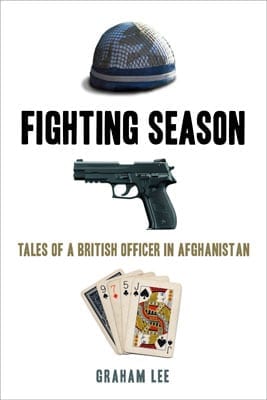A review of Fighting Season by Graham Lee
At school, one of my classmates was a chap named Graham Lee. We used to travel home together on the same bus from Lancaster and as both our mothers worked at the same university and shared a love of all things equestrian, we had much in common.

Naturally, as happens when one goes to university, we lost touch and it was the phenomenon that is Facebook that caused us to regain contact with one another recently. Whilst I may have enjoyed a somewhat colourful time working for a billionaire, launching drinks brands and writing, Lee has been involved in something far more important in the time since we left Lancaster Royal Grammar School in 1999.
Lee, after Cambridge and Sandhurst, served in Kenya and Germany and then as an officer in the British Army’s spearhead Air Assault Brigade was sent to Afghanistan. In Fighting Season: Tales of a British Officer in Afghanistan, he recounts his experiences in a way that reveals that fighting a war there is very much different to how we see it in newspapers and on our televisions.
Mixing the every day travails of being a soldier, though doing so unlike others who’ve written of the Afghan campaign without focusing too much on a lack of equipment and bashing the government, Lee paints a picture of a country where loyalty changes constantly. Alongside accounts of dealings with the “Bond villain” General Muhayadin, who goes mad when a consignment of tomato paste isn’t delivered on time, but whom “knew exactly what he was doing” when exploiting the British into building checkpoints; Lee graphically explains how power, dominance and sex are thought of by many soldiers:
“ ‘Smash her in,’ was the phrase we’d been taught. It replaced ‘make love to her.’ It was a good phrase because it removed the necessity of being desired… Every man in the army knew how to dominate and be dominated. Power and violence were our bread and butter… Power. Domination. Violence. Sex.”
The book is not without humour. A passage about an “ancient general,” for example, tells of how, for him, the phrase “well done” had become a “reflex action” as he’d used it so much:
“Outside a country church he’d be introduced to a frail old lady with the line ‘this is Margaret. Her sister was killed in the blitz you know.’”
The Taliban themselves are presented as the unseen enemy in the main but again wit is used to depict them in a passage about ICOM intercepts:
“Taliban 1: Go and bring me the two headed thing that uses a lot of ammunition, not a pickaxe!
(He was talking about a rocket propelled grenade)
Taliban 2: OK.
Taliban 1: One time, when I asked this someone brought me an actual pickaxe!”
On a more serious note, the book deals with the death of Lee’s colleagues and delves into the psyche of being a soldier in passages such as:
“I could remember seeing British soldiers in Northern Ireland when I was a boy on holiday, driving past them and watching them look down on our car from behind their guns. They’d seemed like a horrible bunch of bastards. Now it was me behind the machine gun, encased by armour and uniform, with the little boy in rags standing in front of me, the muzzle of my gun covering half of his tiny body. How strange is life, I thought.”
Fighting Season is a book that points out the illogical nature of the Afghans and the seriously high level of bribery in their country. It details the horrors of war but also reveals how soldiers use humour to keep themselves sane.
In his final paragraph, Lee talks about being in his officers’ mess bar discussing how girlfriends often compare Afghanistan to a “big game of Lazerquest” and do not understand the differences betweem artillery and guns. He concludes with the line:
“And with that we bought ourselves another beer, and started talking about something else.”
When we meet again, Graham, the beer is on me.
Fighting Season by Graham Lee. Published by Duckworth Overlook, 2012. ISBN: 9780715644979. £16.99.
To purchase a copy, go to: http://www.amazon.co.uk/Fighting-Season-Graham-Lee/dp/0715642979
